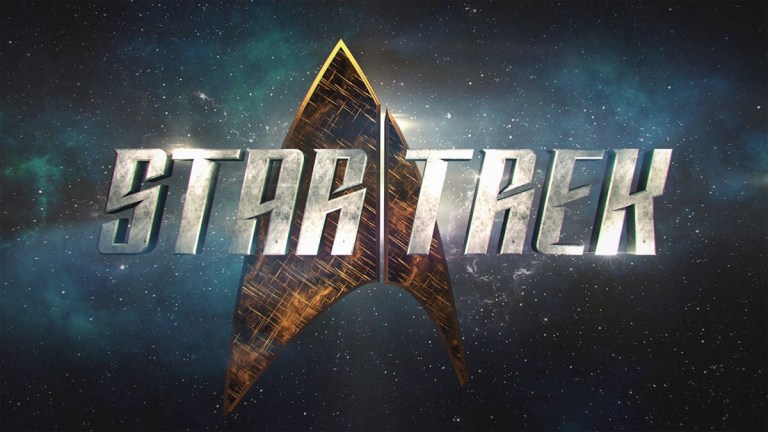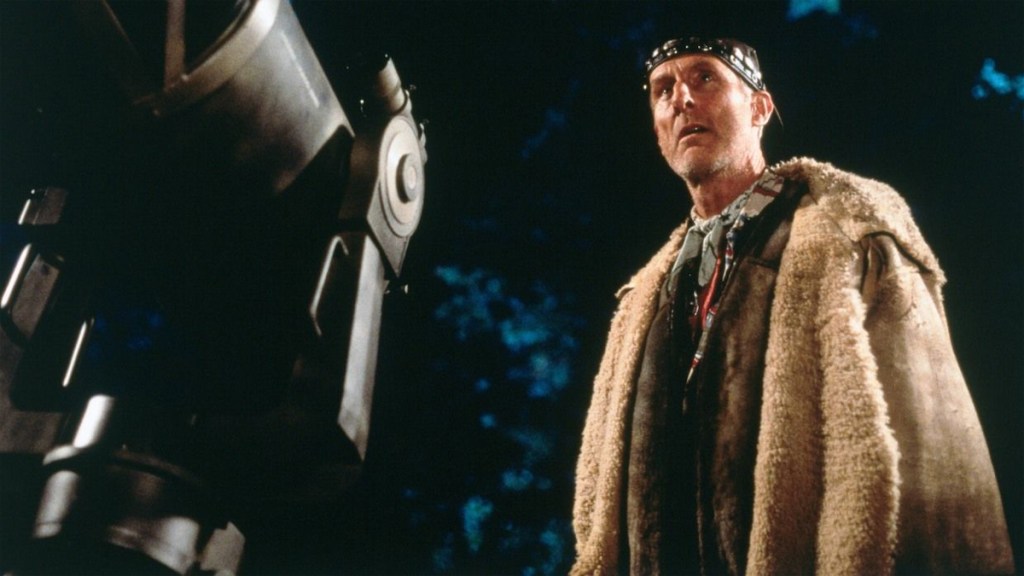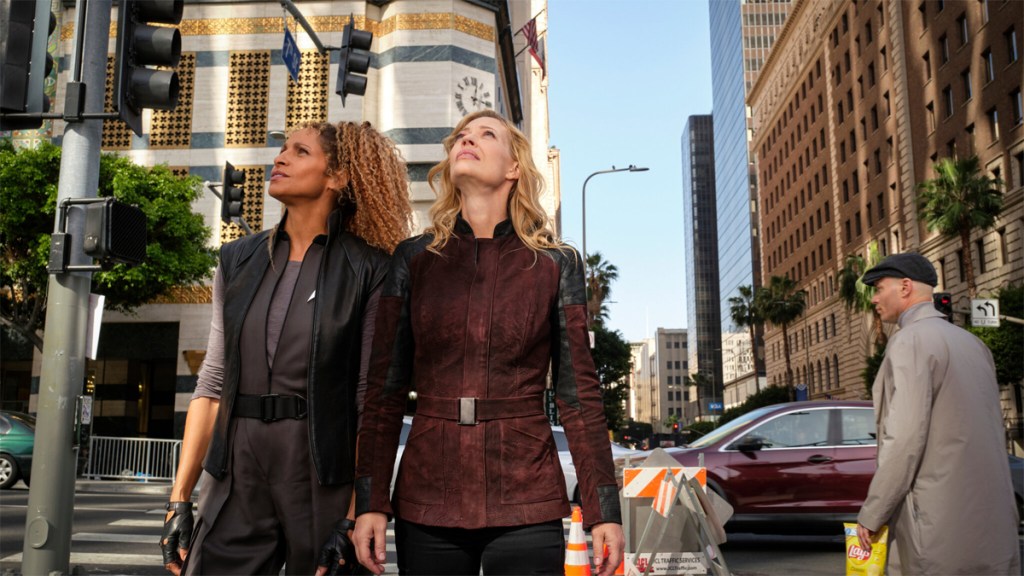Star Trek and the Shadow of World War III
Star Trek's fictional WWIII casts a long shadow over its timeline, and now Discovery and Picard are exploring how hard-won the show's utopia was.

It is set in a distant, utopian future, but ever since the original series Star Trek has sought to hold a mirror to contemporary political and moral dilemmas.
In documentary series The Center Seat: Celebrating 55 Years of Star Trek, now available in the UK on IMDb TV, director Brian Volk-Weiss looks at how the show commented on issues such as the Cold War, Vietnam, Civil Rights, and the issue of euthanasia, among others. But as Volk-Weiss points out, there is one issue that has loomed over the Star Trek universe since its inception.
“We talk about this in Center Seat a little bit, all Trekkies know the foundation of Star Trek, in canon, the Federation and Starfleet, everybody’s known since the original series the foundation of those organisations is World War III,” Volk-Weiss says.
Your Last So-Called ‘World War’
It’s true that World War III has cast a shadow over Star Trek from the start. In ‘Space Seed’, the episode that introduced Khan Noonien Singh, Spock describes the Eugenics Wars as “the era of your last so-called ‘World War’”. Later, the episode ‘Bread and Circuses’ sees Spock mention that 37 million people died in Earth’s World War III.
Even when not referenced directly, we see it reflected in episodes like ‘The Omega Glory’, set in a nuclear wasteland that is mysteriously similar to a post-nuclear Earth, right down to the text of the US Constitution.
Star Trek is, whichever way you cut it, the story of a post-apocalyptic Earth. It made sense as a piece of backstory when the show began. Nuclear war was a constant, real and immediate threat, the Cuban Missile Crisis a recent memory. In the sixties a World War III must have seemed like an inevitability – if you give something a sequel people are automatically going to expect a trilogy. That it might not strike until the 1990s or the 21st century must have seemed as optimistic as anything else in the series.
Even when the Star Trek: The Next Generation pilot aired, only two years before the Berlin Wall came down, nuclear Armageddon was considered such an inevitable part of our future history that it made up a significant portion of the plot of ‘Encounter at Farpoint’. We see Q dressed up as a World War III soldier, and the crew of the Enterprise put on trial in a post-apocalyptic, lawyer-free trial in the age of “nuclear horror”.
From Future History to Canon Lore
Then the Berlin Wall came down. The international stage shifted. A lot of sci-fi future histories started to seem pretty silly in an age where Gorbachev was doing adverts for Pizza Hut.
“People kind of glossed over and don’t think about it too much,” Volk-Weiss tells us. “Even in First Contact, in a weird way it’s glossed over a little bit.”
Star Trek: First Contact is set in 2063, in the aftermath of World War III, and while everyone’s dress is fairly scrappy looking, the lush pine forests that surround Zefram Cochrane’s laboratory are hardly the result of a nuclear winter.

Star Trek: Enterprise references the war a few times, particularly in its closing episodes, but it already feels like Canon Lore rather than a future event that we’re supposed to believe will happen.
While various source across Star Trek canon agree that World War III starts sometime in the mid-2020s (I know, we’ll get to that) and carries on until the 2050s, we see plenty of stories and references that talk about space colonies, interplanetary and even interstellar missions taking place during that time. Most of this is the simple result of TV writers not paying as much attention to continuity as Memory Alpha editors, but it also reflects the fact that World War III simply wasn’t at the forefront of everyone’s minds the way it has been.
In Star Trek: Deep Space Nine, when O’Brien sees a mid-21st century altered by time travel, he remarks “And that wasn’t the mid-21st century I read about in school. It’s been changed. I mean, Earth history has been through its rough patches, but never that rough.” Which must have been pretty grim given it was a period of nuclear war.
A Deadline Approaches
That story was ‘Past Tense’, an episode set in a dystopian 2024 where the homeless were rounded up into camps and forgotten about. If that seems prescient, it’s only because it seemed equally relevant at the time.
“We weren’t being predictive. We were just looking out our windows in the 90s,” Deep Space Nine producer Robert Hewitt Wolfe has said.
2024 gets one other mention in the Star Trek canon, in the Star Trek: The Next Generation episode, ‘The High Ground’, when Data refers to “the Irish reunification of 2024”.
Like World War III, this is a prediction that seemed dated following the Good Friday Agreement, but the chaos around Brexit has suddenly made it a lot more plausible. Brexit is only one of a number of frightening and dramatic events that have occurred over the last decade, and once again, Star Trek is responding to them.

“Every ten years there’s a new Bond, a new Batman, to a certain degree now a new Star Trek, and sometimes they resonate with their time and sometimes they don’t and sometimes it’s in the middle,” Volk-Weiss says. “I feel like DS9 is a great example of that. I feel like the greatest example of that of all time is Battlestar Galactica. That whole thing was about 9/11 and the War on Terror. Sometimes it works, as with Battlestar Galactica, sometimes it doesn’t work, as with Enterprise. The problem with what Enterprise did is there were already so many bad things going on you didn’t need to create a brand-new character to cut Florida in half. There was already enough to talk about, while in Galactica it organically fit into the storyline. I think what Discovery and Picard are doing is more on the organic side.”
Star Trek has shown us a potential utopia, and with Deep Space Nine and the use of the black ops Section 31 of Starfleet in Enterprise, Star Trek: Into Darkness and Discovery, it has shown us the potential dark side of that utopia. But new Star Trek seems to be doing something new that even Enterprise didn’t – showing us how we get there.
“I think Discovery and Picard, in their own ways, are slowly but surely showing us, no it was a rough start, it took a lot to get to replicators,” says Volk-Weiss. “It took a lot to get to the Prime Directive. We didn’t get here by accident, and we didn’t get here easily. I think, as the onion peels more and more both shows are showing the underbelly of what would be the future of Star Trek.”
Star Trek: Discovery was the first to remind us of the effects of World War III in the second series episode, ‘New Eden’. Here Star Trek returned to another of its favourite tropes – humans transposed from Earth history and set up as an independent colony on another world. This time, the transposed humans were the congregation of a church rescued from a nuclear blast.
Later, Discovery would encounter its own apocalypse in the form of the “the burn”, which destroyed galactic civilisation as we know it and forced the Federation to rebuild from scratch, and rediscover its values along the way.

And Star Trek: Picard? We know that the history of the Federation has changed, and the early impression suggests this will be a darker and more fascistic future for humanity. And to fix it? Picard and friends go back in time to 2024. From what we know of Trek canon, World War III is supposed to begin in 2026.
Star Trek obviously doesn’t predict the future. The show has never been about telling us what will happen, only finding new ways of talking about what is happening now. There are no easy answers in science-fiction to the fears a lot of us currently have, whether about hypothetical conflicts or the very real violence happening in Ukraine during the Russian invasion. Once again though, people are scared and seriously talking about the threat of another world war. Perhaps what Star Trek can and has always offered fans is the hope that the same humans who commit world-ending atrocities might one day be capable of building a utopia.
Star Trek: The Center Seat is available to stream now in the UK on IMDb TV.
